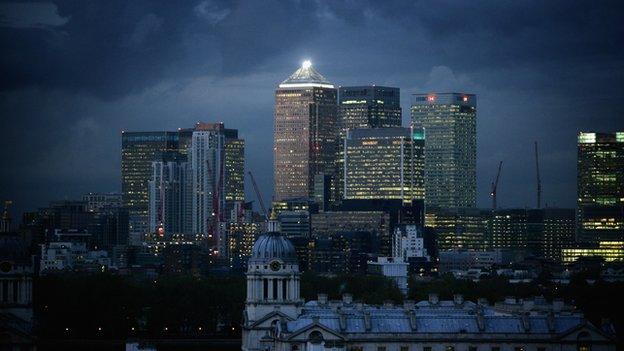Bank of England puts global recession at heart of doomsday scenario
- Published

Economic shock - Britain's banks are to be tested for a global economic downturn
The Bank of England has outlined its annual "stress test" - the exam Britain's major banks must go through to ensure they have enough available capital to withstand a global downturn.
After last year's test which focused on a collapse in house prices in the UK, this year's test will have a more international flavour.
Under the scenario, global growth will fall, the Chinese economy slow markedly and the UK and the eurozone will face a new bout of recession with rising unemployment and falling property prices.
In Britain, the economy will contract by 2.3%.
As the Bank grapples with the new crisis, interest rates in the UK are cut to zero.
And as the global economy slumps, the oil price collapses to $38 and deflation - causing companies to withdraw investment - "increases the real burden of debt and increases market concerns".
The world would see the worst levels of deflation since the 1930s.
Some major global banks and companies could default on debt repayments.
To be clear, the Bank's five-year scenario does not mean it believes these events will happen.
This is what is called a "tail-risk" event. It could happen but the probability is exceedingly low.
But then again, no-one predicted the severity of the financial crisis.
And actually this scenario is not as bad as what actually happened in 2008, even though it is put in place to try to stop those calamitous events ever occurring again.

An economic storm: the Bank of England will test UK banks for the worst levels of deflation since the 1930s
Six banks
Six banks will have their balance sheets tested against this stress test - HSBC, Barclays, Royal Bank of Scotland, Lloyds, Santander UK and Standard Chartered.
The building society Nationwide will also be tested.
Many believe that this will be a tougher test for banks with large international businesses - HSBC and Standard Chartered - than the UK domestic test of last year.
Co-op Bank, a mainly UK bank, has been dropped from this year's test.
"Last year's stress test demonstrated how much stronger the core of the UK financial system has become since the financial crisis," said Mark Carney, the governor of the Bank of England.
"This year's test will have a different focus.
"By assessing the resilience of the UK banking system against a major external shock, we will improve further our ability to identify vulnerabilities and we will ensure that banks have plans in place to address a wider range of possible stresses.
"We are committed to ensuring our major banks are resilient [and] that they can weather shocks without calling on tax payer support."
'Severe' tests
Under the scenario, banks will be obliged to continue lending to the UK economy, one of the biggest risks of a global turndown.
The results of the tests, which bank officials believe are "severe", will be published in December.
Banks might then be required to raise more capital to strengthened their balance sheets.
One big missing piece of the stress test is a break up of the eurozone.
That might seem odd, given events in Greece.
But Bank officials explain that the eurozone is a more immediate issue and that the direct exposure of the UK banks to Greece is low at about £2bn.
Put simply, British banks should already have in place the mechanisms to deal with a eurozone break-up.